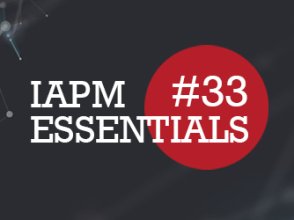1 2 3 4 5 6 7 8 9 10 11 12 13 14 15 16 17 18 19 20 21 22 23 24 25 26 27 28 29 30 31 32 33 34 35 36 37 38 39 40 41 42 43 44 45 46 47 48 49 50 51 52 53 54 55 56 57 58 59 60
IAPM Essentials #33 - PM news | IAPM
What was eventful last week? What has happened in project management? Read Essentials #33 to discover the IAPM's recommendations of the week.
How to retain a good workforce | IAPM
Finding good project managers is not easy - so companies should keep their good ones.
IAPM Essentials #32 - PM news | IAPM
What was eventful last week? What has happened in project management? Read Essentials #32 to discover the IAPM's recommendations of the week.
Agile transformation and its aberrations | IAPM
Agile is not a super food and not a miracle cure! Find out which aberrations come along with agile transformation in this article.
How to overcome little to no project resources | IAPM
The real feat in project management is to be able to manage the whole process even without sufficient resources.
IAPM Essentials #31 - PM news | IAPM
What was eventful last week? What has happened in project management? Read Essentials #31 to discover the IAPM's recommendations of the week.
Scrum Guide 2020 - What's new? | IAPM
Mid-November 2020 was the 25th birthday of Scrum and release of a new version of the Scrum Guide. The good news: Scrum remains Scrum.
IAPM Essentials #30 - PM news | IAPM
What was eventful last week? What has happened in project management? Read Essentials #30 to discover the IAPM's recommendations of the week.
Blog for project managers | IAPM
As a project manager, you need to examine central issues of project work and also constantly find answers to newly arising questions.
How to use social media to enhance project management | IAPM
We already know that social media is one of the most powerful marketing tools nowadays. But can we also use it in project management?
Certified Project Manager (IAPM) cheat sheet | IAPM
In October, the two cheat sheets for our Junior-certifications were published. The first one has been the cheat sheet for the Certified Junior Project Manager...
IAPM Essentials #29 - PM news | IAPM
What was eventful last week? What has happened in project management? Read Essentials #29 to discover the IAPM's recommendations of the week.












